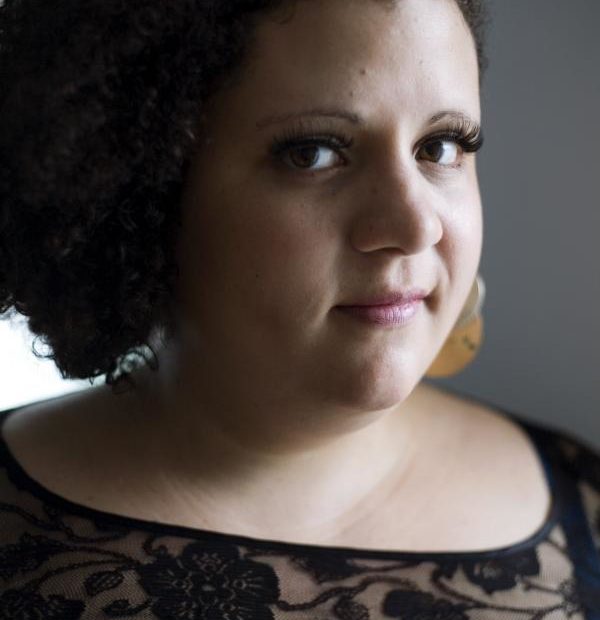"I wish for an Achmed Street in Potsdam"
An Interview with SchwarzRund
Postcolonial Potsdam: Who are you?
SchwarzRund: I am SchwarzRund. By now, it has become my official pen name. First it was the name of my blog, but now I publish everything, artistic or academic, under that name.
I am a Black Dominican in Germany with both passports and I work in various fields. Storytelling and poetry/performance texts are the heart of my work. But painting, writing and online ranting are very important to me as well – for my activism and for me personally.
- SchwarzRund.de
- Twitter: @SchwarzRund
- Biskaya auf Goodreads

PP: What do you do in your everyday life?
SR: Actually, I deal with power dynamics 24/7. In the past, my focus was on deficiencies (which I still find important and great), but by now I try to look at the beauty and uniqueness which develops as a consequence of the pain of oppression. To find, search for and create resistance in art is what interests me at university, in my journalistic work, in my blog and in my novel. Christiane Hutson’s term multidimensional vulnerability influenced this change a lot. I want to explain and teach less, instead I want toobserve and celebrate more.
PP: You wrote an Afropolitan Berlin novel titled Biskaya. What is it about?
SR: It is the story of the 35-year-old musician Tue, she is a Black German and lives in Berlin. She lives in a queer flat share, in which a suicide happens. It leads her into a crisis and she ends up in a psychiatry. This experience, as well as new insights into her own diaspora and family history change her goals. Tue begins to search for new terms for her art. She experiences and survives the difficulties a Black person has to face in a predominantly white country. The novel is about revolution, resistance, the music business, queer communities, and passionate love for sweet potatoes.
PP: Why do you call the novel Afropolitan?
SR: It could just as well be called queer, neuro-diverse, crazy, diasporic or Black. These are all main themes of the novel. In the end, I decided to call it Afropolitan, because my own Afropolitan perspective includes all of this. Thus, it is my Afropolitanism… (laughs)
The novel is mainly set in Berlin, it refers to a fictive Black European island called Biskaya and its capital city Amo (a reference to Anton Wilhelm Amo). Potsdam also plays an important role…
PP: What is the role of Potsdam in your novel?
SR: One crucial scene of the novel is set in Potsdam. I don’t want to spoil too much here…
One question that accompanies Tue is where her Blackness comes from. At one point, she learns that she is related to Achmed. Achmed is a real person, he was the first Black German whose name and portrayals we know. He was displaced – just as many other People of Color serving at court – by order of Prince Carl Alexander of Prussia. Whether Achmed is the name his parents gave him is unknown, but it is known that he lived in Schloss Glienicke, the castle by the lake Griebnitzsee in Potsdam. Among the golden lions and other relics that the Prince brought home from his travels to other cultures, Achmed was just another exoticized ‘souvenir’. Until today, the most human picture of him can be found in the castle. Until today it costs quite a lot of money to see this representation of Achmed. This is a continuity that affects me – in a negative way. Therefore, two of the protagonists in my book decide to help Achmed – they have the courage that I lack… (laughs)
Potsdam and the culture of forcefully displacing Black people is a symbol for the rootlessness caused by white people until today. There are many Black children in Germany who don’t know from where they have been adopted. This happens either because adoption agencies don’t pass on any or only rough information about their backgrounds or because the parents (natural or adoptive) don’t want to pass on that information. On a higher level, this phenomenon could stand for the Gate Islands on which it wasn’t clear where the slaves came from, islands like the Dominican Republic or Porto Verde. It is a diaspora that has to build its own identity from remaining fragments, colonial images produced by the white environment and little hints from the past because the white society ties them to the ‘other’ by excluding them.
Potsdam is also a very suitable place because I experienced the worst racism of my adult life there. I do not only disapprove of Potsdam’s glorification of the Prussian times from an urban planning perspective, artistic or leftist beliefs, but first and foremost from a Black perspective.
PP: What do you wish for the future of our society?
SR: I wish for an Achmed Street in Potsdam, instead of the rebuilding of yet another, horrifying monument of past white rule. Instead of a May Ayim Shore, I would wish for a whole May Ayim Avenue and the reflection of Black history in school and university books. I wish for policies that acknowledge colonial liabilities and appropriate reparations. I wish for curricula at universities which hold lecturers accountable to keep pace with the times and to question every scientific presupposition.
Only with recognition for the normal(izing) racism of the now, will reparations become possible, as well as a rectification of the so-called development aid structures which still provide less for the countries in question than they take out of them.
A decolonial aspiration ultimately entails an anti-capitalist, anti-sexist, queer and ableism-critical perspective because all of those structures support each other to maintain power and domination.
